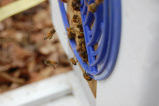|
A Surprising Nectar: Harnessing the Invasive Knotweed for Exceptional Honey
Nestled in the center of Rye, New Hampshire, the Tucker Pollinator Sanctuary Apiary recently hosted a UNH Extension workshop, welcoming participants eager to learn about the sanctuary's transformation into a haven for pollinators. Following the engaging discussions, the group embarked on a captivating tour of the honey house, witnessing the meticulously crafted process of converting raw honey into a delectable treat. As the tour progressed, an array of honey samples, each boasting a unique hue, captured the attention of the onlookers. A particularly captivating sample, a rich dark chocolate shade, sparked curiosity among the participants. Their initial guesses of the type of honey it was, goldenrod and buckwheat, were far from the mark. To their surprise, it was knotweed honey. While knotweed is often regarded as an invasive species, its presence unexpectedly translates into a remarkable late-season honey, fondly dubbed New Hampshire's Manuka honey. Its superior taste, surpassing even that of Manuka honey, is a testament to nature's intricate balance. Knotweed's flowering period, spanning late summer to early fall, coincides with the honeybees' tireless quest for nectar. Along with an abundance of native pollinators, countless honeybee foragers diligently work the knotweed blossoms, meticulously selecting the finest nectar for their hives. The resulting honey, a dark reddish purple, embodies the essence of knotweed's resilience. Its flavor, a harmonious blend of mildness, subtle woody notes, and hints of molasses, delights the palate. But knotweed honey's allure extends beyond taste. It is brimming with antioxidants, a testament to its nutritional value. Moreover, it contains resveratrol, the renowned "red wine molecule," associated with reduced risk of heart disease and diabetes. In a world often fixated on perfection, knotweed honey serves as a reminder that even the most unexpected sources can yield extraordinary outcomes. Embracing the transformative power of nature, we can transform an invasive species into a symphony of flavor and wellness.
0 Comments
Leave a Reply. |
Details
SEABEE HONEY BLOGAuthorA beekeeper in New Hampshire [email protected] Archives
December 2023
Categories
All
|

 RSS Feed
RSS Feed